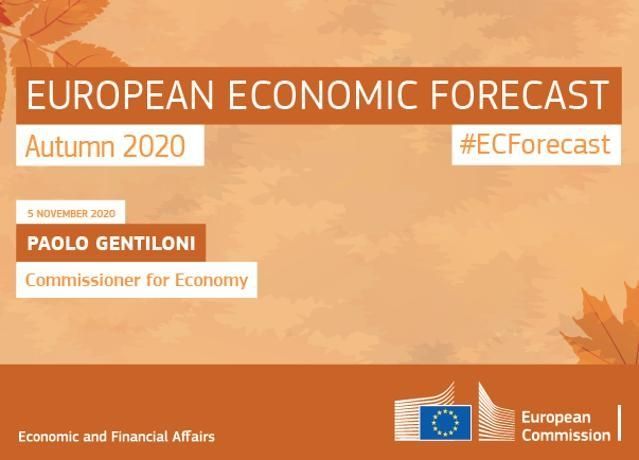The coronavirus pandemic represents a very large shock for the global and EU economies, with very severe economic and social consequences.
Economic activity in Europe suffered a severe shock in the first half of the year and rebounded strongly in the third quarter as containment measures were gradually lifted. However, the resurgence of the pandemic in recent weeks is resulting in disruptions as national authorities introduce new public health measures to limit its spread. The epidemiological situation means that growth projections over the forecast horizon are subject to an extremely high degree of uncertainty and risks.
An interrupted and incomplete recovery
The Autumn 2020 Economic Forecast projects that the euro area economy will contract by 7.8% in 2020 before growing 4.2% in 2021 and 3% in 2022. The forecast projects that the EU economy will contract by 7.4% in 2020 before recovering with growth of 4.1% in 2021 and 3% in 2022. Compared to the Summer 2020 Economic Forecast, growth projections for both the euro area and the EU are slightly higher for 2020 and lower for 2021. Output in both the euro area and the EU is not expected to recover its pre-pandemic level in 2022.
The economic impact of the pandemic has differed widely across the EU and the same is true of recovery prospects. This reflects the spread of the virus, the stringency of public health measures taken to contain it, the sectoral composition of national economies and the strength of national policy responses.
Rise in unemployment contained compared to drop in economic activity
Job losses and the rise in unemployment have put severe strains on the livelihoods of many Europeans. Policy measures taken by Member States, together with initiatives at EU level have helped to cushion the impact of the pandemic on labour markets. The unprecedented scope of measures taken, particularly through short-time work schemes, have allowed the rise in the unemployment rate to remain muted compared to the drop in economic activity. Unemployment is set to continue rising in 2021 as Member States phase out emergency support measures and new people enter the labour market, but should improve in 2022 as the economy continues to recover.
Deficits and public debt set to rise
The increase in government deficits is expected to be very significant across the EU this year as social spending rises and tax revenues fall, both as a result of the exceptional policy actions designed to support the economy and the effect of automatic stabilisers.
Inflation remains subdued
A steep fall in energy prices pushed headline inflation into negative territory in August and September. Core inflation, which includes all items except energy and unprocessed food, also fell substantially over the summer due to lower demand for services, especially tourism-related services and industrial goods. Weak demand, labour market slack and a strong euro exchange rate will exert downward pressure on prices.







Leave a Reply